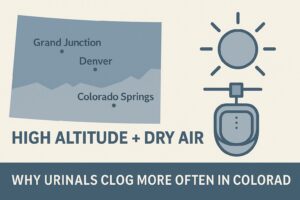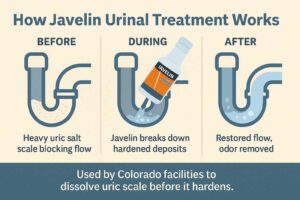Why Colorado Businesses Deal With More Urinal Clogs — and What You Can Do About It
If you manage restrooms anywhere in Colorado — a school, brewery, ski lodge, or government building — you’ve probably seen the same problem: urinals that drain slowly or clog again just weeks after a plumber visit.
It’s not your maintenance routine; it’s your environment. Colorado’s hard water, thin dry air, and high elevation combine to create the perfect storm for uric salt buildup inside urinal lines. Here’s what’s really going on — and how to stay ahead of it for good.
Colorado’s Hard Water Is No Joke

If you’re along the Front Range Denver, Colorado Springs, or Fort Collins you’re dealing with some of the hardest water in the U.S.
Each flush carries calcium and magnesium minerals that mix with urine and form uric salt scale. Over time, that buildup hardens like concrete along the bottom of your drain lines, shrinking flow until it slows or completely stops.
Once that happens, you’re calling a plumber and paying $200 or more to fix a problem that started weeks earlier with mineral-heavy water.
Reference: USGS Water Hardness Map
The High-Altitude, Dry-Air Effect
Colorado’s thin, dry mountain air might make for great skiing, but it’s tough on plumbing. Because there’s less humidity, water in traps evaporates faster, leaving salts and minerals behind that crystallize along the pipe floor.
It’s a cycle that repeats daily: less water, more salt, faster buildup, which is why even a brand-new urinal can clog internally long before it looks dirty on the surface.
Heavy Use Makes It Worse

Think about where most urinals are in Colorado: ski resorts, airports, breweries, universities, hotels. These restrooms run nonstop, pushing thousands of flushes a day through mineral-heavy lines. Combine that with Colorado’s dry air and elevation, and you’ve got the perfect conditions for buildup.
The Real Cost of a Clogged Urinal
- Plumber visits: average $200–$300 per call
- Downtime & Odor: hurts customer experience and sanitation scores
- Pipe damage: chronic buildup can require full line replacement
The Fix: Javelin Urinal Treatment

If you want to stay ahead of uric scale, Javelin Urinal Treatment gives you a professional-grade solution that’s simple and safe to use.
It dissolves uric salt buildup without heat, fumes, or harsh acids. Just pour it in, give it time to work, and within hours, flow is restored.
- ✅ Dissolves hardened uric scale from Colorado’s mineral-heavy water
- ✅ Safe for all pipe materials — PVC, copper, cast iron
- ✅ No smoke, heat, or odor
- ✅ Costs far less than repeated plumber calls
Facilities that treat once a month stay clear—they’re not calling plumbers or dealing with overflow issues.
Stay Ahead of the Colorado Effect
In Colorado, you’re battling the perfect storm: hard water, high altitude, and dry air. It’s not your fault the environment’s working against you. But with a consistent monthly treatment plan, you can stop buildup before it starts and keep restrooms open, clean, and problem-free.
Buy Javelin Urinal Treatment →
More State Insights from Javelin
Explore how climate and water conditions across the U.S. impact restroom maintenance—and how Javelin provides a consistent fix everywhere.
Colorado Facility FAQ
Why do urinals clog faster in Colorado?
Hard water, high elevation, and dry air cause uric salts to harden quickly inside drain lines, reducing flow and increasing blockages.
How often should urinals be treated in Colorado?
Most facilities stay clear with a monthly treatment. High-traffic sites such as airports or ski resorts may treat biweekly for best results.
Is Javelin Urinal Treatment safe for all plumbing?
Yes. It’s non-corrosive and safe for PVC, copper, and cast iron pipes when used as directed.
Does Javelin help with odor?
Yes. By removing uric scale—the root cause of odor—Javelin eliminates smells at the source.
